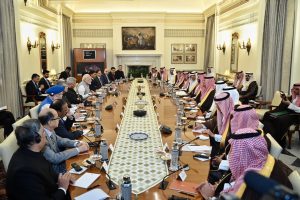India-Saudi Arabia relations received a significant boost over the past week at the multilateral and bilateral levels during the visit of Crown Prince and Prime Minister of Saudi Arabia Mohammed bin Salman bin Abdulaziz Al Saud (also known as MBS) to New Delhi for the G-20 summit on September 9-10, followed by a state visit on September 11.
At the multilateral level, India and Saudi Arabia will partner with the United Arab Emirates, France, Germany, Italy, the European Union, and the United States in a connectivity initiative, the India-Middle East-Europe Economic Corridor (IMEC).
IMEC will include two separate corridors — the eastern corridor connecting India to the Arabian Gulf and the northern corridor connecting the Gulf to Europe. Upon its completion, it “will provide a reliable and cost-effective cross-border ship-to-rail transit network to supplement existing maritime and road transport routes” between Asia and Europe. It is expected to speed up trade between India and Europe by 40 percent, according to European Commission President Ursula von der Leyen.
On the bilateral front, India and Saudi Arabia held their first meeting of the India-Saudi Strategic Partnership Council (SPC), which they had set up during Indian Prime Minister Narendra Modi’s visit to Riyadh in October 2019. Optical fiber networks, trade in local currencies, and expediting negotiations for a free trade agreement between India and the Gulf Cooperation Council (of which Saudi Arabia is a member) were among the issues discussed at the SPC meeting in New Delhi.
The two sides signed eight bilateral agreements in the fields of energy, desalination, digitalization, combatting corruption, and promoting micro, small and medium enterprises.
The two countries also took a step forward in implementing the West Coast refinery-cum-petroleum project. First unveiled in 2015, the mega project — of the $100 billion investment in India promised by the Saudis, $50 billion has been already earmarked for the project — saw ARAMCO, ADNOC, and India’s public sector oil companies inking a preliminary deal in 2018. However, it has not taken off since.
In New Delhi, India and Saudi Arabia agreed to establish a joint task force to expedite the project. They have also upgraded their energy relationship to a “comprehensive energy partnership.”
The state visit of the Saudi Crown Prince is significant as it came six months after Saudi Arabia ended its hostility with Iran through a deal that China brokered. Additionally, it took place weeks after Riyadh joined the BRICS grouping at its Johannesburg summit.
Although India-Saudi Arabia relations go back several millennia, ties were complex, especially in the Cold War decades. The two countries were on opposite sides in several global conflicts, as in Afghanistan during the Soviet invasion and the first Taliban regime, for example.
Importantly, Saudi Arabia was a strong supporter of Pakistan, especially on the Kashmir dispute, straining the New Delhi-Riyadh relationship.
However, relations have improved since the mid-2000s, with trade — most notably, India’s purchases of crude oil — energizing ties.
Saudi Arabia is India’s fourth largest trading partner and while trade is growing — it was worth $52.75 billion during 2022-2023 — the yawning trade deficit is of concern to New Delhi. Indeed, the deficit, which amounted to $31.3 billion in 2023, is at its highest ever between the two countries.
Interestingly, while petroleum and crude products continue to account for the bulk of India’s trade with Saudi Arabia, its proportion has dropped from 90 percent in 2009-10 to 78.9 percent in 2022-23.
India’s relations with Riyadh have not only grown, but also there is growing cooperation in areas like counterterrorism, for example, which would have been impossible a decade ago.
During Modi’s visit to Riyadh in 2016 the two sides agreed to enhance cooperation in counterterrorism operations, sharing of intelligence related to money laundering and terrorism financing, and in cybersecurity, including prevention of the use of cyberspace for terrorism, radicalization, and disturbing social harmony. The joint statement “called on all states to reject the use of terrorism against other countries; dismantle terrorism infrastructures where they happen to exist and to cut off any kind of support and financing to the terrorists operating and perpetrating terrorism from their territories against other states; and bring perpetrators of acts of terrorism to justice.”
Although no country was named in this regard, Indian officials claimed that it was an oblique reference to Pakistan, although it could just as well have referred to Iran.
The joint statement at the end of MBS’ recent visit to New Delhi called on all countries “to reject the use of terrorism against other countries, dismantle terrorism infrastructure where it exists and bring perpetrators of terrorism to justice swiftly.”
Again, no country was named.
However, unlike his previous visits to India, when he would hop across to Pakistan to signal the kingdom’s even-handedness in dealing with the two South Asian countries, this time around, the Saudi Crown Prince’s New Delhi visit was a stand-alone one.
Did Saudi Arabia just signal a new willingness to de-hyphenate India and Pakistan in its South Asia policy? Not necessarily. After all, four months ago, when India hosted a G-20 tourism working group meeting at Srinagar in Jammu and Kashmir, Saudi Arabia was among the countries that stayed away.
Saudi Arabia’s ties with India are growing rapidly. But it is still too early for Delhi to see a shift in Riyadh’s South Asia policy.

































